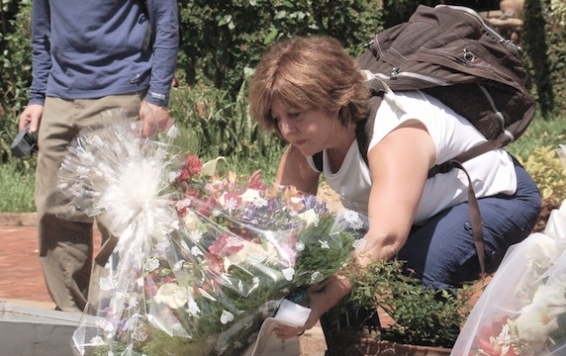This month marks 20 years since the outbreak of genocide in Rwanda. Trying to comprehend the magnitude of a tragedy that claimed 800,000 lives is nearly impossible. You piece it together in small fragments, often from the stories of those who survived. Over the past decade, I have heard many of these stories firsthand.
Before leaving for one of my first trips to Rwanda, I asked Ingrid -- a friend and survivor of the genocide -- if I could pay my respects to her deceased mother during my visit. That year, Ingrid received confirmation that her mother's bones were entombed at the Rwandan Genocide Memorial in Kigali. I wanted to place a bouquet at the mass gravesite. I'll never forget what it was like to lay those flowers on the ground. I felt a powerful connection to my young friend, her family, and the many families whose lives were brutally taken from them.
In preparing to return to Rwanda next month, I asked another friend, Edith, if I could lay flowers at the site of her mother's remains. I saw Edith's body tense up as she listened to this question. For a moment, she became limp. Edith told me that this would be quite impossible. Just this past year -- 19 years after the genocide -- Edith learned what happened to her mother. In a soft voice, she explained that her mother's body was cut into pieces and eaten by her murderers.
The horror of Edith's past drives her to create a better future. She works part-time for the Shoah foundation to document the stories of fellow survivors from Rwanda. One of approximately 50 Rwandan survivors in Los Angeles, Edith is the only member of her community who frequently shares her story with the broader public.
Edith explains to me that she speaks to keep the memory of her mother alive -- for her, her children, and the world. Failing to speak out, in Edith's eyes, would mean that her mother's life would be lost forever.
Jewish World Watch believes that it is our collective responsibility to join survivors like Edith to safeguard, sanctify, and amplify the memory of the victims. At our Walk to End Genocide on April 27th, Edith will tell her story - along with survivors of the Shoah and other genocides of the 20th and 21st century. Their words will light a torch of remembrance and a fire of activism, calling on our participants to turn the tragedies of the past into lessons for the future.
Originally appeared on April 10, 2014 in The Jewish World Watch Blog: One Life at a Time hosted by The Jewish Journal.
